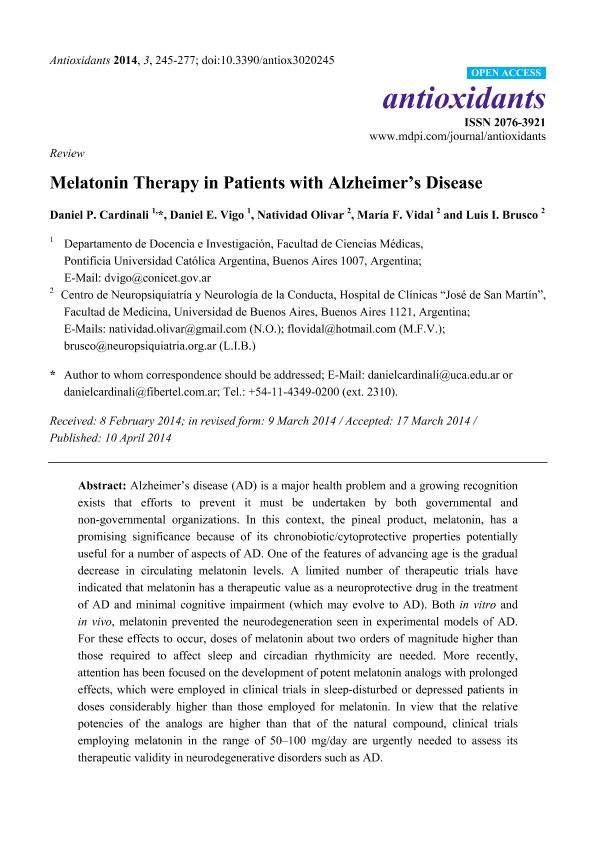Artículo
Melatonin therapy in patients with Alzheimer’s disease
Cardinali, Daniel Pedro ; Vigo, Daniel Eduardo
; Vigo, Daniel Eduardo ; Olivar, Natividad; Vidal, Maria Florencia
; Olivar, Natividad; Vidal, Maria Florencia ; Brusco, Luis Ignacio
; Brusco, Luis Ignacio
 ; Vigo, Daniel Eduardo
; Vigo, Daniel Eduardo ; Olivar, Natividad; Vidal, Maria Florencia
; Olivar, Natividad; Vidal, Maria Florencia ; Brusco, Luis Ignacio
; Brusco, Luis Ignacio
Fecha de publicación:
04/2014
Editorial:
Multidisciplinary Digital Publishing Institute
Revista:
Antioxidants
ISSN:
2076-3921
Idioma:
Inglés
Tipo de recurso:
Artículo publicado
Clasificación temática:
Resumen
Alzheimer’s disease (AD) is a major health problem and a growing recognition exists that efforts to prevent it must be undertaken by both governmental and non-governmental organizations. In this context, the pineal product, melatonin, has a promising significance because of its chronobiotic/cytoprotective properties potentially useful for a number of aspects of AD. One of the features of advancing age is the gradual decrease in circulating melatonin levels. A limited number of therapeutic trials have indicated that melatonin has a therapeutic value as a neuroprotective drug in the treatment of AD and minimal cognitive impairment (which may evolve to AD). Both in vitro and in vivo, melatonin prevented the neurodegeneration seen in experimental models of AD. For these effects to occur, doses of melatonin about two orders of magnitude higher than those required to affect sleep and circadian rhythmicity are needed. More recently, attention has been focused on the development of potent melatonin analogs with prolonged effects, which were employed in clinical trials in sleep-disturbed or depressed patients in doses considerably higher than those employed for melatonin. In view that the relative potencies of the analogs are higher than that of the natural compound, clinical trials employing melatonin in the range of 50–100 mg/day are urgently needed to assess its therapeutic validity in neurodegenerative disorders such as AD.
Archivos asociados
Licencia
Identificadores
Colecciones
Articulos(OCA HOUSSAY)
Articulos de OFICINA DE COORDINACION ADMINISTRATIVA HOUSSAY
Articulos de OFICINA DE COORDINACION ADMINISTRATIVA HOUSSAY
Articulos(SEDE CENTRAL)
Articulos de SEDE CENTRAL
Articulos de SEDE CENTRAL
Citación
Cardinali, Daniel Pedro; Vigo, Daniel Eduardo; Olivar, Natividad; Vidal, Maria Florencia; Brusco, Luis Ignacio; Melatonin therapy in patients with Alzheimer’s disease; Multidisciplinary Digital Publishing Institute; Antioxidants; 3; 2; 4-2014; 245-277
Compartir
Altmétricas



